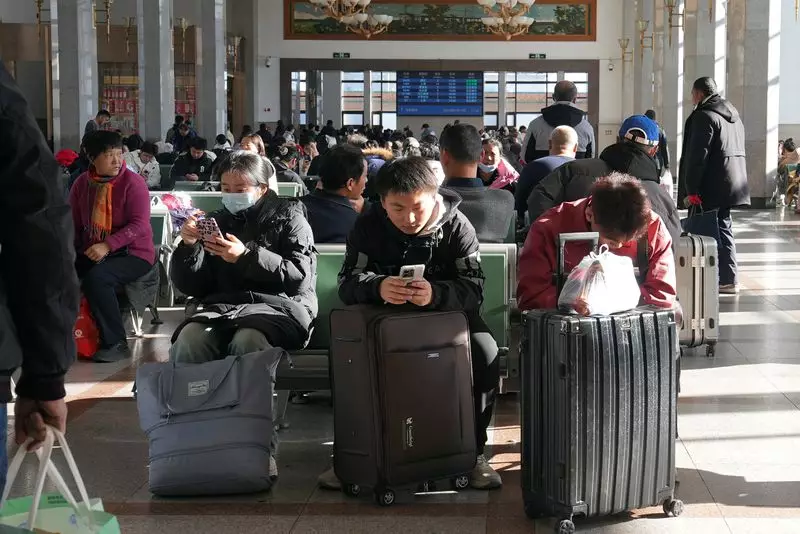The onset of the Lunar New Year in China is marked by the beginning of the annual travel rush, an event that encapsulates the profound cultural significance of family reunions. This year, the festivities commenced with travelers boarding trains at the stroke of midnight from Beijing, embarking on journeys to various provinces like Anhui. As families prepare for the traditional reunion dinner on the eve of the New Year, scheduled for January 29, 2024, an impressive 40-day travel period has been set, expected to see millions returning to their hometowns or venturing out for vacations, momentarily putting aside the anxieties brought on by economic concerns.
Authorities predict that this travel season will witness a staggering 9 billion domestic trips, a figure that corresponds with 2024’s estimates despite last year’s total of 8.4 billion trips. This surge in passenger movement reflects a nation that, despite economic adversities, is eager to uphold long-standing traditions and reconnect with loved ones during one of its most important holidays.
Statistics underline the scale of this year’s travel ambitions, with railway services anticipating a volume of over 510 million passengers. Air travel is also on the rise, projecting more than 90 million air passengers, while the most significant proportion of journeys—approximately 7.2 billion trips—will be made by private vehicles, as reported by national broadcaster CCTV. This shift towards personal transport highlights a desire for flexibility and the conveniences that come with it, especially in a landscape where public transportation remains challenged by various factors.
While the sheer numbers paint a picture of a bustling holiday traffic, they also juxtapose sharply against a backdrop of economic turmoil. As China’s economy grapples with a slow recovery from sluggish domestic demand and a crisis-ridden property market, many holidaymakers are determined to enjoy the festivities irrespective of financial unease. Travelers express optimism that the economic climate will not hinder their celebrations. Wang Zhixu, a property management professional reflected a common sentiment by stating, “Peace within our country brings us the most happiness,” signaling a collective yearning for stability amidst uncertainty.
The contrasts in sentiment were particularly pronounced among younger generations. Many young adults, such as 22-year-old Shi Zhenyue, highlighted the pressing concern for employment amidst the struggling economy. Shi shared her fears about job availability, reflecting a broader concern as youth unemployment reached a staggering 18.8% last August—marking the highest levels recorded since new measurement techniques were implemented. As the nation celebrates, the hope for a turn in fortune remains essential for those poised to enter the job market.
This year’s increased demand for multiple destination tickets and a rise in hotel bookings indicate a willingness to explore and embrace the holiday season, even while some young people feel trapped between inadequate job opportunities and ambitions for further education. As Shi noted, “If the economy does get better, I will have a better chance of finding a job,” showcasing the link between economic health and personal aspirations.
Finding Solace in Simplicity
In stark contrast to the bustling city life, many young adults are choosing to retreat from urban pressures in favor of quieter, more manageable lifestyles. For instance, He, a 33-year-old small business owner from Liaoning province, articulated the relief that comes from living outside major cities. Choosing to return to her hometown post-graduation, she enjoys a simpler life, emphasizing the psychological comfort found in familiar settings away from the competitive atmosphere of large urban centers.
These individual narratives illustrate a broader trend: as the Lunar New Year approaches, more people are prioritizing mental wellbeing over material success, finding joy in connection and community rather than in consumption and competition. This shift, although born from necessity in challenging economic times, signifies resilience and adaptability—qualities integral to the spirit of the Lunar New Year.
As millions of travelers make their way home for the Lunar New Year, the collective experiences reflect a nation balancing deep-rooted traditions with contemporary challenges. While the economic situation casts shadows of uncertainty, the determination to celebrate this significant cultural event speaks volumes about the resilience and optimism inherent in the Chinese spirit. The essence of the festival transcends mere statistics; it is about connection, renewal, and hope for a brighter future. In celebrating the New Year, the people embrace not just their heritage but also the shared aspirations for a prosperous year ahead.

